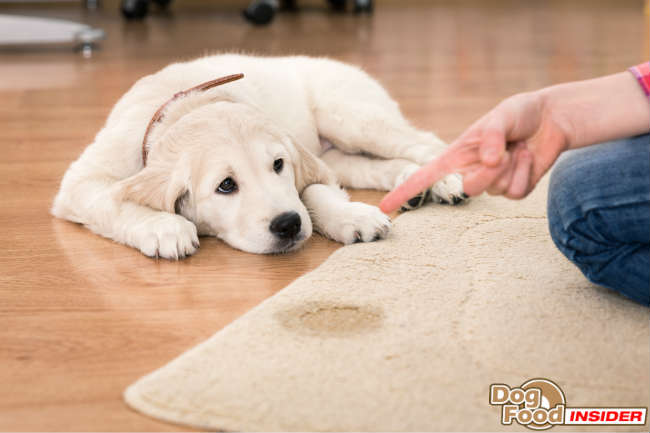
This post may contain affiliate links. We are compensated for referring customers to our affiliate partners.
Getting a new puppy is one of the most exciting times in the life of a dog lover. But it’s also the start of teaching your puppy all the things he needs to learn. Right at the top of the list is potty training your puppy. A puppy that soils in the house can put a strain on even the most loving relationship. Fortunately, house training your puppy isn’t that hard if you are patient and follow these suggestions.
Potty Training Puppies: The Basics
Most puppies do not come already potty trained. It’s up to you to teach your puppy what he needs to know. Your puppy has probably been living with his mom and siblings for the first few weeks of his life and mom has been doing most of the clean up work. Your puppy doesn’t know he shouldn’t relieve himself in the house and he doesn’t know how to communicate with you to tell you he needs to go outside. It just takes some time to teach your puppy these things. So, be patient. Watch your puppy. Learn to read his body language. And take him outside often, even if you just think he needs to go. Putting your puppy on a good schedule will also help him with his training. Most puppies will be trained in just a few weeks.
Potty Training A Puppy Should Be Customized
Some puppies take a little longer than others to house train. Male puppies sometimes learn a little more slowly than female puppies. And Toy breeds can learn more slowly than medium and large breeds for some reason. These are generalities but they are often true. The important thing is to be patient and don’t get angry at your puppy. Most of the time when your puppy has an accident he was probably giving some signals that he needed to go out and you missed them. Each puppy will have their own personality traits and body signals.
- RECOMMENDED E-BOOK – How to Housebreak Your Dog in 7 Days (Revised)
Use A Schedule
Your puppy will learn his potty training faster if you use a good schedule with him. This means feeding him at the same times each day and taking him outside at about the same times each day. This will help your puppy learn what to expect. A good schedule might look like this:
- Wake up (early) and take your puppy outside
- Feed your puppy breakfast
- Take your puppy outside again
- Puppy play time
- Take your puppy outside again
- Puppy nap time
- Take your puppy outside again
- Feed your puppy
- Puppy play time
- Take your puppy outside again
- Puppy nap time
- Take your puppy outside again
- Feed your puppy dinner
- Take your puppy outside again
- Puppy play time
- Take your puppy outside before bed
- Bed time
If you notice a pattern here it’s because there is one. Puppies need to go out after every meal and every time they play. They also usually need to potty right after they wake up. This schedule is for a very young puppy. As your puppy gets a little older you will probably change him to two meals per day. He won’t need to potty quite as much either or need so many naps. By then he will be able to go a little longer between potty breaks. But a puppy that’s 8 to 12 weeks old will need a schedule like this to avoid accidents in the house.
Learn Your Puppy’s Body Language
You can also avoid accidents by learning your puppy’s body language. Puppies will give signals to indicate that they need to potty. You will probably notice the following:
- Sniffing the floor
- Looking for a private place like behind furniture
- Going back to a place where he’s previously had an accident
- Going to the door
- Giving you glances
- Coming to sit near you
- Whining or barking
If you notice your puppy doing any of these things you should take him outside right away. Young puppies aren’t good at communicating with people yet but these are the signals they use to indicate they need to go out. As your puppy gets a little older and figures out how to communicate, his signals will get more precise. He might bark and run to the door or put a paw on your knee to tell you he needs to go out. Adult dogs can train you so you know exactly what they want when they need to go out. But you and your puppy have to develop that kind of communication.
If you’re not paying attention and you miss your puppy’s signals, he won’t have any choice. He will have some accidents in the house. His little bladder isn’t very big and he can’t wait very long. So don’t get mad at him. Try to pay better attention next time.
Training Aids
There are some training aids you can use to help house train your puppy. Some people like to use potty training pads for house training. These pads have been treated with a chemical that encourages a puppy to pee on them instead of going somewhere else. They are good to use if you are training your puppy to potty indoors in a certain area. They are preferable to using newspapers. They often have plastic underneath to keep urine from seeping through. You can also use them outdoors. Place them in a particular spot in the yard where you want your puppy to relieve himself. This will keep your puppy from pottying in places you don’t want him to go.
Some people like to use porch potty-type pans for their puppies and dogs. These are trays inlaid with artificial grass or real sod that allows urine to go through to a tray underneath. Solid waste can be removed as necessary. Potty pads can also be used with these pans to encourage a puppy to use them.
- Need To Use Training Pads? These Are The Ones We Recommend
You can also use a dog crate to help potty train your puppy. Dogs and puppies don’t like to soil their sleeping area. When a puppy is crate-trained and sleeps in a crate at night, it helps him sleep through the night without having an accident. Puppies should not be confined to the crate for more than a few hours. Puppies can usually stay in the crate for about two hours per month of age before needing a potty break. A puppy would need to be about four to five months old before he could stay in the crate all night.
Potty Training Tips
There are a few training tips that will help you potty train your puppy. Your puppy has a better chance of sleeping through the night without having an accident if you feed him his dinner before about 7 o’clock. If you feed him dinner after this time he will almost certainly need to go out during the night. If you feed him dinner no later than 7 pm then he should be able to potty for the last time by about 11 pm. It also helps if you put his water up by 10 or 11 pm so he won’t need to pee during the night. Once your puppy is older and able to control his bladder better, you can leave his water down during the night.
Remember to use praise and rewards for potty training. Many people scold puppies when they have accidents but they forget to praise and reward their puppies when they successfully potty outside! Tell your puppy he’s doing a good job. Give him some treats. Celebrate when he gets it right. Make pottying something fun.
If you stick with it and take your puppy outside often, he should be house trained in just a few weeks. In some cases puppies catch on very quickly and they can be house trained in just a couple of weeks. Sometimes it takes several weeks. Every puppy is different. Just be patient, watch for your puppy’s signals, and use a good schedule. Your puppy will learn and he’ll be potty trained in no time at all.
One last thing… if you haven’t checked it out yet, we also have an article on properly feeding a puppy that you might be interested in.
